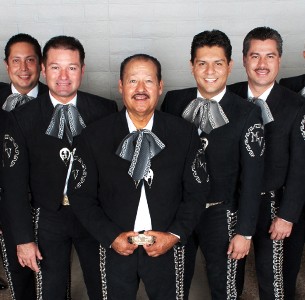
“The mariachi is my life,” vows José “Pepe” Martinez. “Ever since I started learning music at 10 years old, it has always been the mariachi,” Martinez, Director of the Mariachi Vargas de Tecalitán for nearly four decades, is speaking via phone from Mexico CIty about his experiences with the world’s most iconic and beloved mariachi ensemble, Mariachi Vargas de Tecalitlán, now in existence for 115 years.
Martinez was born in Tecalitlán itself, a small town located outside of Guadalajara, Jalisco, the area that is considered the birthplace of mariachi. As founder of another acclaimed mariachi group, Mariachi Nuevo Tecalitlán, his brilliant and joyful arrangements caught the ear of Ruben Fuentes, owner and Director of the Mariachi Vargas de Tecalitlán. Martinez had become renowned for his popurrís that are now Mariachi Vargas favorites, lengthy medleys which unite popular pieces around a cultural theme, such as “Popurri A Los Gallos,” (songs about fairs and cock fights) and “Popurri Mi Tierra,” (songs about Mexico).
Martinez ceded his own ensemble to his brother when he was asked to come and take charge of the Mariachi Vargas, and says he’s never turned back: “I’ve been the director for 38 years, and snce the time the spirit was born in me to be the director, I haven’t changed course”.
Asked why the Mariachi Vargas has prevailed against odds such as time and Mexico’s political and cultural changes, Martinez muses that for one things, they are not afraid to try new music and experiment: “Sometimes we play very Mexican things, sometimes, classical music, sometimes boleros, sometimes Spanish songs, sometimes things from other countries.”
As an example he describes how in recent years, the Mariachi Vargas de Tecalitán has performed with philharmonic orchestras around the world. Martinez even recently composed an opera called “Cruza la Cara de la Luna” for the Houston Grand Opera and converses excitedly about the project. “When they first asked, I thought, Oh, my God! How am I going to do this!” “Bendito sea Dios!” The opera has now been performed with great success not only in Houston but in Paris, where it was recorded live.
However, Martinez emphasizes that not all honor is due the Mariachi Vargas, but the beauty and spirit of the music itself: “All mariachis in Mexico, we were named the most beautiful music that exists, and in all of Mexico and all of the world, were given a special honor,” he comments proudly, referring to the the fact that in 2011 the Mariachi with its string music, song and trumpet was named by UNESCO as an Intangible Cultural Heritage of Humanity.
Nevertheless, of all mariachis, the Mariachi Vargas de Tecalitlán is held particularly near and dear by audiences world round. Martinez says their particular success comes about because the members of the ensemble have a very special camaraderie. “Everybody has their style, their way of working, and the love they have for it. We ourselves have many ways of loving our clients, and them loving us. Mariachi Vargas has a special love that it gives to people everywhere we play. This is our special magic.”
He continues, “People fall in love with our music and they fall in love with us! As an interviewer, I myself can attest to experiencing more than a few moments of the mariachi charm during a warm and delightful conversation that ends with Martinez saying, “Señorita Catalina, it has been a pleasure to talk with you! And I send you a hug all the way from over here”.
And as to the future? Mariachi will always exist, as will the music, says Martinez: “I think everybody needs to love music, feel the music, to live much more happily, much more joyfully.”
Mariachi Vargas de Tecalitlán returns to Chicago and Symphony Hall on October 7, 2012 and goes to Milwaukee on October 19, 2012.
Check Catalina’s radio show Beat Latino (On FB and itunes too!) as well as recent NPR features to explore the past, present and future of Latin music.
